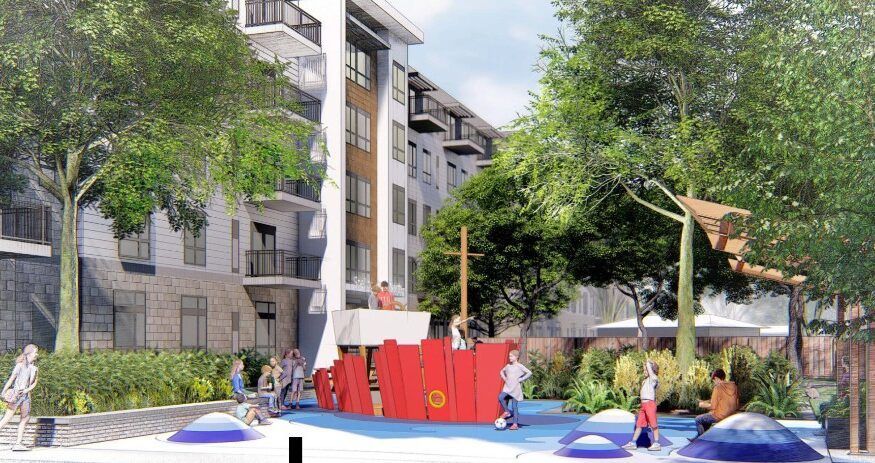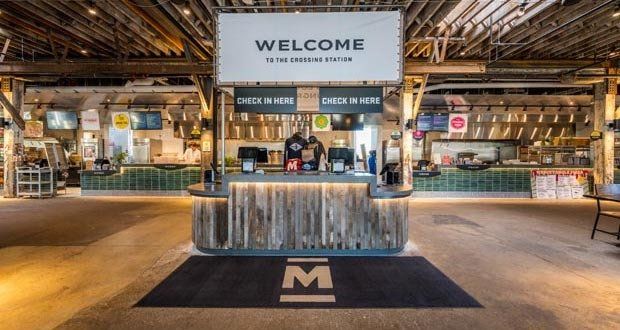News

By Julie Pierce
•
June 29, 2023
Published in: Finance & Commerce Author: Brian Johnson June 13, 2023 After landing a key funding commitment from Hennepin County, Lupe Development Partners and Wall Cos. are pushing ahead with a long-planned $32 million project that will bring 90 affordable apartments to a former public works site. Part of the Snelling Yards development, a joint venture with Ecumen, the new building will rise on a site adjacent to The Hillock, Ecumen’s fully leased affordable senior housing development. The development site is at East 45th Street and Hiawatha Avenue in Minneapolis. Frana Cos. is the contractor and Pope Design Group is the architect on the project. A green common space and outdoor “tot lot” paved playground for kids will connect the two housing complexes, creating what the developers call an “intergenerational campus” of affordable housing for seniors and families. Hennepin County recently awarded the project $900,000 in funding through its Affordable Housing Incentive Fund program, which funds the development of affordable housing units for “very low-income households.” “We know there’s absence of affordable apartment communities with ample space for larger families and Snelling Yards is an excellent solution to that in the heart of the city,” John Wall, president of Wall Cos., said in a statement. “The investment from Hennepin County is an encouraging sign that allows this project to move forward. We’re ready to seize this moment and deliver on our vision to create a multigenerational community at Snelling Yards.” The project site is a former city of Minneapolis Public Works storage area. The developers said they are “eager” to remove existing storage units on the site and break ground in 2024. The goal is to have the new units ready for occupancy in July 2025. The project has been in the works for years. Finance & Commerce first reported in 2015 that the city was seeking a housing developer for the 3.3-acre Snelling Yards site. In 2017, the city selected the Wall Cos., Lupe Development and Ecumen team as preferred developers. One challenge was maintaining a project that would appeal to funding partners. To that end, the developers included some units targeted to homeless veterans and others for households at 30% of area median income. Also added were family-friendly three- and four-bedroom dwellings. “When we started this, the funders were funding these 50% and 60% [AMI] tax credit projects that everyone was doing,” said Jeff Ellerd of Wall Cos. “And those were typically studios, ones and some two-bedroom units. “Since that time, their focus has changed and, for better or for worse, they have pushed developers to include more 30% units and units that are prioritized for people who have been homeless in the past year or are at threat of being homeless. “We had to adapt to what the funders wanted.” Meanwhile, the developers have been cobbling together a mix of funding sources. Among those is a $1 million award from the city of Minneapolis Affordable Housing Trust Fund. In May 2020, Hennepin County awarded $800,000 for the Snelling Yards senior housing component. Other sources include 4% Low Income Housing Tax Credits, mortgage financing, and potential tax increment financing from the city of Minneapolis and Livable Communities Act funding from the Metropolitan Council. “Met Council funds are typically awarded at the end of the year. If we are successful, project financing closing and start of construction would occur in 2024,” Ellerd said.

By Holly Dolezalek
•
July 22, 2022
Top Projects of 2021: The Market at Malcolm Yards By Holly Dolezalek Finance & Commerce July 22, 2022 Just a few years ago, the historic Harris Machinery building in the Prospect Park neighborhood was in sad shape. A fire in the dead of winter had caused significant damage to the brick and timber manufacturing building, and collapsed its gabled roof. But the Prospect Park Neighborhood Association wasn’t going to give up on it, and neither was Patricia Wall. The building would be saved and refurbished into a food hall: The Market at Malcolm Yards. “I have a background in the food service industry, and I had seen food halls in other places and thought we needed one in the Twin Cities,” said Wall, owner. “We knew it would create a wonderful ambience to put a food hall in a space restored from the past.” But the renovation would be no small thing. To get the building ready for use, the debris from the fire had to be removed, and the whole building had to be carefully shored up in stages to prevent further damage. “It was a massive undertaking,” said Jillian Kalogerson, CEO at contractor Kalcon. “A lot of steel went into that building.” The resulting 19,000-square-foot food hall has nine kitchens for lease. Most of the leases are for nine months or a year, so that the market can switch up food vendors. It also has a beer wall with self-pour taps.

By Dan Niepow
•
November 11, 2021
Malcom Yards Was Never Just About the Food The developers behind the Prospect Park food hall hope to show there's "life on this side of the transitway." By Dan Niepow Twin Cities Business November 02, 2021 The Market at Malcolm Yards drew a good deal of local attention long before its official opening in July. Originally slated for 2018, the food hall promised to rejuvenate the raffish Minneapolis neighborhood north of University Avenue between Stadium Village and Prospect Park. What few realize was that the food hall was rather incidental to the developer’s grander plan for the area. When John Wall first happened on the 20-acre parcel of land near the old United Crushers grain elevator, he initially planned to transform it into a research park for the University of Minnesota, whose East Bank campus is steps away. Wall, president of Minneapolis-based developer The Wall Cos., says the U could have benefitted from such a venture. Research parks are generally filled with private companies that can help commercialize university research. “Research parks pop up adjacent to research universities all over the world,” he says. “As a matter of fact, every major public research university in this country has a research park near it, except for Minnesota. ” But he didn’t get much interest. “After a really long time of trying, I found that we weren’t getting anywhere,” he says. “We weren’t finding private companies. We weren’t getting help from the university.” So he took a step back and proposed starting out with new apartment buildings. His aim, he says, was to “show that life exists on this side of the [campus-to-campus] transitway.” The Wall Cos. purchased land and got to work. A food hall would show the neighborhood’s promise, he reasoned. “We went around the country, talked to developers, and got ideas for what a food hall could do for a community,” says Patricia Wall, owner of the Market at Malcolm Yards (and married to John Wall). She says she got inspiration from a trip to a food hall in Vancouver. Food halls not only help rejuvenate neighborhoods, they also function as incubators for local chefs. Patricia Wall thinks this one has the potential to change the local restaurant industry for the better, acting as a “market correction” for the industry, long plagued with razor-thin margins and high operating costs. ( Keg & Case Market in St. Paul and the North Loop Galley beat Malcolm Yards to market with the concept.) Tucked into the Malcolm Yards food hall are nine restaurant concepts, one of which is owned by the Wall Cos. Patricia Wall says each of the proprietors has signed a two-year agreement to pay Wall a percentage of sales. In her view, the market stalls are a low-barrier, low-risk way for chefs to road-test their ideas. “Chefs don’t have to go into debt to build their kitchens,” she says. But the market is only the first phase of development at the site. Next on the docket is a pair of adjacent apartment buildings to be known as the Flats at Malcolm Yards and Malcolm Station Apartments. The latter building will include 7,800 square feet of commercial space. As for the rest of the land? That’s still to be determined, but John Wall says it will likely be more residential, with a possibility of some future office space and life sciences buildings. He says there are also plans for a “significant arts program,” which could include entertainment venues. The market will remain the “centerpiece of the neighborhood,” he says (though the adjacent Surly Brewing and the new O’Shaughnessy Distillery might contest that title). “My thought in doing this food hall was, ‘What is going to make people want to get in their car in the dead of winter and drive down here?’” says Patricia Wall. “What’s going to be worth it? If the food is exceptional and there’s a lot of variety, they’ll want to keep coming back.”

By Jason DeRusha
•
October 22, 2021
New Restaurant Review: The Market at Malcolm Yards In which a food hall skeptic comes around By Jason DeRusha Minnesota Monthly October 20, 2021 I'm a food hall skeptic. Yes, I've been to Reading Terminal Market in Philadelphia and I adored DiNic's broccoli rabe sandwich. Grand Central in Los Angeles is cool, as is Chelsea Market in New York, but the Minnesota efforts have left me wanting. I want more variety at St. Paul's Keg and Case, I want better quality and vibe at both Graze and North Loop Galley, I want to know why I should go to a fancy food court instead of an actual local restaurant. Enter the Market at Malcolm Yards. Over the last couple months, every single one of my friends has asked if we can meet there. They heard the buzz about the chef from Bellecour killing it with a Korean-fried chicken sandwich, or the burger they never got around to ordering from that Minneapolis ice cream shop. The list continued: the vegetable-focused restaurant, the dosa people, the empanadas, sushi, Joey Meatballs' handmade pasta. Malcolm Yards offered so much variety at such high quality. Bike from the University of Minnesota campus or park your car in the shadows of Surly's destination brewery, and you'll be ready to explore in a few easy steps. You essentially open a tab by swiping your credit card, and you then receive a card that you use at the nine independent restaurants, the cocktail bar, and the pour-your-own beer, wine, and cider wall. Drop your card at the end of your visit and you're set, with an 18% surcharge. There's no tipping-the surcharge pays for the market staff who also clear your table-and the prices are clear.



